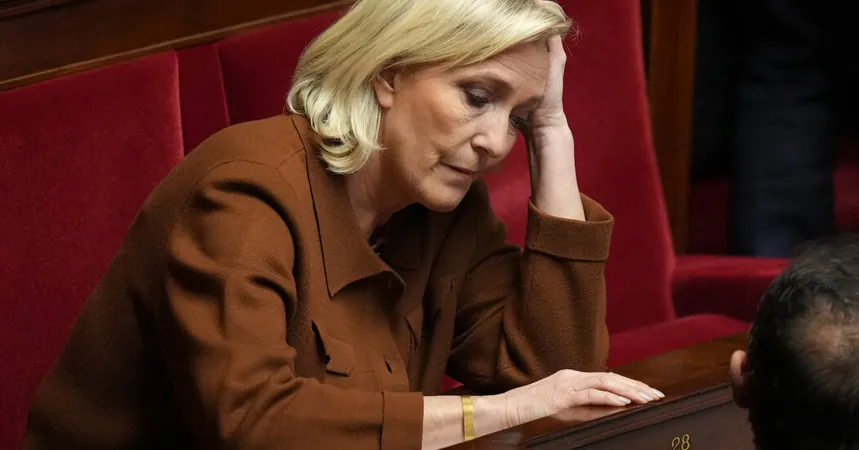
Could Marine Le Pen's Political Career End in a Puff of Legal Smoke?
2025-03-30
Author: Ting
Marine Le Pen, the prominent leader of France’s far-right National Rally, faces a potential political storm that could not only reshape her career but also alter the landscape of French politics as the country gears up for the 2027 presidential election. Having previously campaigned for presidency in 2012, 2017, and 2022, and steadily increasing her electoral support each time, Le Pen’s journey could take a shocking turn if she is found guilty of embezzlement.
The stakes are high: Le Pen and several co-defendants have been accused of squandering roughly $4.8 million in European Union funds, allegedly by exploiting no-show jobs designated for parliamentary aides who were primarily working as party staffers instead. Prosecutors are pushing for hefty penalties, including a five-year prison sentence—three years suspended—a fine of approximately €300,000 (around $325,000), and a five-year ban from seeking public office.
Should Le Pen, who describes a guilty verdict as a “political death” sentence, be disqualified, it would create a significant void in the upcoming election for which President Emmanuel Macron, currently unable to run due to term limits, is set to step down. As the leader of the largest party in the National Assembly with 123 seats, her absence could pave the way for a new breed of candidates vying for the presidency.
Her shifting political persona, which has attempted to move away from the party's historically anti-Semitic roots to embrace a more mainstream approach, has resonated with disaffected voters. This evolution has made her not just a fringe figure but a prominent contender—the favorite, in many eyes—for the next election.
Yet, the potential repercussions of a guilty verdict are not merely legal but deeply political. Critics like Gérald Darmanin, the current Justice Minister, warn that disqualifying Le Pen could undermine democratic integrity, fostering the perception that the system is rigged against the ascendant far-right. "Madame Le Pen must be fought at the ballot box, not elsewhere," Darmanin emphasized in a social media post.
In the broader European context, as anti-immigrant sentiments gain traction and figures like Le Pen find footing, any punitive action against her may ignite a rallying cry for the far-right across the continent, drawing comparisons with the political shifts witnessed in Hungary and Italy.
Moreover, there’s an undercurrent of concern about the fragility of France's democratic institutions. The Fifth Republic is currently grappling with political dysfunction, characterized by a chaotic snap parliamentary election last year, a revolving door of prime ministers, and a legislature plagued by profound divides. The scenario casts doubt on the effectiveness of governance and could potentially amplify calls for caution against authoritarian tendencies posed by extreme-right movements.
In addition to the significant implications for France, a negative verdict for Le Pen could draw international criticism, particularly from American figures who may perceive it as part of a broader European initiative to stifle right-wing politics under the guise of safeguarding democracy.
As the clock ticks towards the ruling, speculation is rampant. Should Le Pen be disqualified, the 2027 presidential election would mark the first instance in nearly four decades without a Le Pen on the ballot—potentially a monumental shift in French political history.
Stay tuned, as this legal drama unfolds, and what it could mean for the future of France and its political dynamics!

 Brasil (PT)
Brasil (PT)
 Canada (EN)
Canada (EN)
 Chile (ES)
Chile (ES)
 Česko (CS)
Česko (CS)
 대한민국 (KO)
대한민국 (KO)
 España (ES)
España (ES)
 France (FR)
France (FR)
 Hong Kong (EN)
Hong Kong (EN)
 Italia (IT)
Italia (IT)
 日本 (JA)
日本 (JA)
 Magyarország (HU)
Magyarország (HU)
 Norge (NO)
Norge (NO)
 Polska (PL)
Polska (PL)
 Schweiz (DE)
Schweiz (DE)
 Singapore (EN)
Singapore (EN)
 Sverige (SV)
Sverige (SV)
 Suomi (FI)
Suomi (FI)
 Türkiye (TR)
Türkiye (TR)
 الإمارات العربية المتحدة (AR)
الإمارات العربية المتحدة (AR)